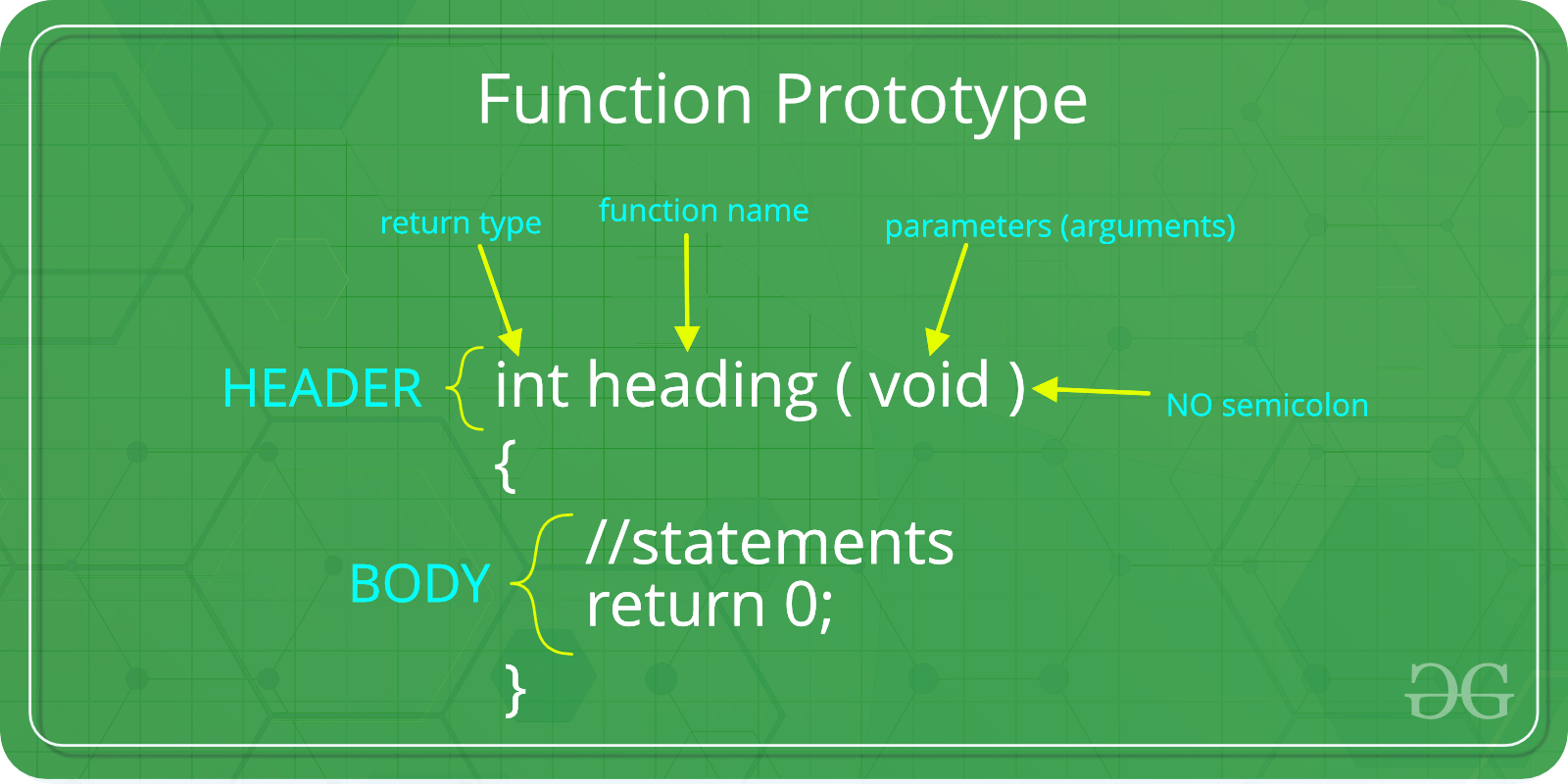#include <stdio.h>
/* function declaration */
void swap(int a, int b);
/* function definition to swap the values */
void swap(int a, int b) {
int temp;
temp = a; /* save the value of a */
a = b; /* put b into a */
b = temp; /* put temp into b */
}
int main () {
/* local variable definition */
int a = 100;
int b = 200;
printf("Before swap, value of a : %d\n", a );
printf("Before swap, value of b : %d\n", b );
/* calling a function to swap the values */
swap(a, b);
printf("After swap, value of a : %d\n", a );
printf("After swap, value of b : %d\n", b );
return 0;
}#include <stdio.h>
int main () {
int *p;
int c;
p = &c;
c = 4;
*p = 21;
int d = 34;
p = &d;
printf("%d")
return 0;
}Line by line outputs
#include <stdio.h>
int main () {
int *p;
int c;
printf("int *p, c\n");
printf("&p: %p - p: %p\n",&p ,p);
printf("&c: %p - c: %d\n",&c ,c);
printf("\n\n");
p = &c;
c = 4;
printf("p = &c;\nc = 4;\n");
printf("&p: %p - p: %p - *p: %d\n",&p ,p, *p);
printf("&c: %p - c: %d\n",&c ,c);
printf("\n\n");
*p = 21;
printf("*p = 21;\n");
printf("&p: %p - p: %p - *p: %d\n",&p ,p, *p);
printf("&c: %p - c: %d\n",&c ,c);
printf("\n\n");
int d = 34;
p = &d;
printf("int d = 34;\np = &d;\n");
printf("&p: %p - p: %p - *p: %d\n",&p ,p, *p);
printf("&c: %p - c: %d\n",&c ,c);
printf("&d: %p - d: %d\n",&d ,d);
return 0;
}Side note: Two different ways to define a pointer and then assing an address to it.
int n = 5;
int *p;
p = &n;int n = 5;
int *p = &n;#include <stdio.h>
/* function declaration */
void swap(int *a, int *b);
/* function definition to swap the values */
void swap(int *a, int *b) {
int temp;
temp = *a; /* save the value of *a */
*a = *b; /* put *b into *a */
*b = temp; /* put temp into *b */
}
int main () {
/* local variable definition */
int a = 100;
int b = 200;
printf("Before swap, value of a : %d\n", a );
printf("Before swap, value of b : %d\n", b );
/* calling a function to swap the values */
swap(&a, &b);
printf("After swap, value of a : %d\n", a );
printf("After swap, value of b : %d\n", b );
return 0;
}In the main function, one integer number and a char are read from the user into the variables x and c respectively. Complete the program by writing the function alter.
alter function takes one integer pointer (address of an integer) and one char variable as parameters. Function does the following operations:
- If char parameter is 'i', then increase the integer pointer parameter by one.
- If char parameter is 'd', then decrease the integer pointer parameter by one.
- If char parameter is 's', then assign the square of the integer pointer parameter to itself.
- Otherwise, do not change anything.
In the main function send variables x and c to the alter function and then print x in the main function.
| INPUT | OUTPUT |
|---|---|
| 22 i | 23 |
| -4 d | -5 |
| 20 s | 400 |
| 20 j | 20 |
#include <stdio.h>
// DO_NOT_EDIT_ANYTHING_ABOVE_THIS_LINE
// DO_NOT_EDIT_ANYTHING_BELOW_THIS_LINE
int main()
{
int x;
char c;
scanf("%d %c", &x, &c);
alter(
// DO_NOT_EDIT_ANYTHING_ABOVE_THIS_LINE
// DO_NOT_EDIT_ANYTHING_BELOW_THIS_LINE
);
printf("%d", x);
return 0;
}Write a function named divideWithRemainder which takes two integer (number, divisor) and two integer pointer variables (*result, *remainder) as parameters:
This function should divide the number by divisor, then store the result in the parameter *result, and store the remainder in the parameter *remainder.
| INPUT | OUTPUT |
|---|---|
| 8 3 | 2 2 |
| 27 4 | 6 3 |
| 10 2 | 5 0 |
#include <stdio.h>
// DO_NOT_EDIT_ANYTHING_ABOVE_THIS_LINE
// DO_NOT_EDIT_ANYTHING_BELOW_THIS_LINE
int main()
{
int n, d, res, rem;
scanf("%d %d", &n, &d);
divideWithRemainder(
// DO_NOT_EDIT_ANYTHING_ABOVE_THIS_LINE
// DO_NOT_EDIT_ANYTHING_BELOW_THIS_LINE
);
printf("%d %d", res, rem);
return 0;
}In the main function, two integer numbers are read from the user into the variables a and b respectively. Complete the program by writing two functions named sums and powered.
sums takes two integers (a and b) and an integer pointer (*sum). The function should store the sum of these two integers in *sum pointer.
powered takes three integers (sum, a and b) and two integer pointers (*sum_p1 and *sum_p2). The function should store the
Output:
First Line: Sum of two numbers
Second Line:
| INPUT | OUTPUT |
|---|---|
| 6 1 | 7 117649 7 |
| 4 4 | 8 4096 4096 |
| 5 0 | 5 3125 1 |
#include <stdio.h>
// DO_NOT_EDIT_ANYTHING_ABOVE_THIS_LINE
// DO_NOT_EDIT_ANYTHING_BELOW_THIS_LINE
int main(){
int a, b;
scanf("%d %d",&a,&b);
int sum;
sums(
// DO_NOT_EDIT_ANYTHING_ABOVE_THIS_LINE
// DO_NOT_EDIT_ANYTHING_BELOW_THIS_LINE
);
printf("%d\n",sum);
int sum_p1,sum_p2;
powered(
// DO_NOT_EDIT_ANYTHING_ABOVE_THIS_LINE
// DO_NOT_EDIT_ANYTHING_BELOW_THIS_LINE);
);
printf("%d %d", sum_p1, sum_p2);
TC_END;
return 0;
}- Think about how we write the regular power.














